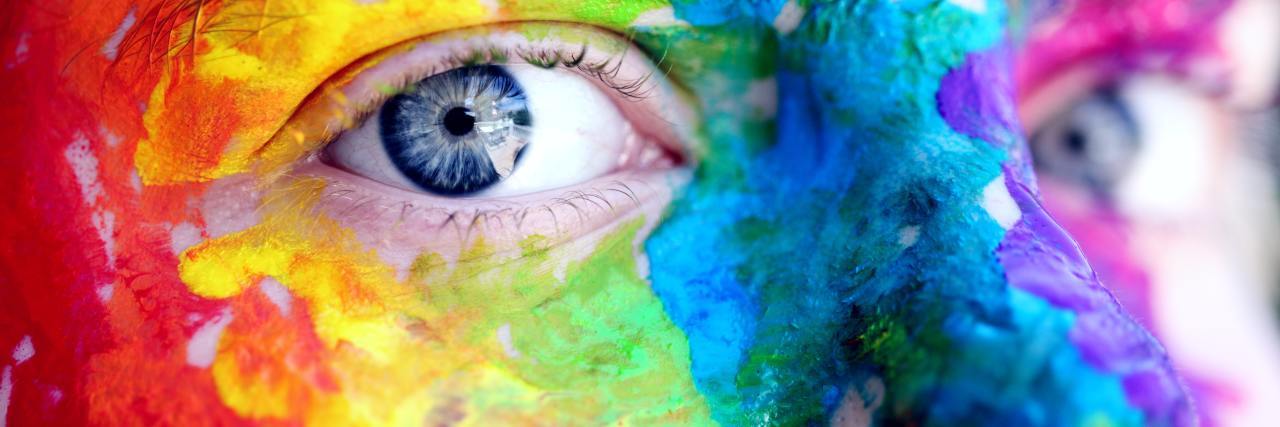How Gender Dysphoria Contributed to My Anorexia Nervosa
Editor's Note
If you live with an eating disorder, the following post could be potentially triggering. You can contact the Crisis Text Line by texting “NEDA” to 741741.
The world starts to shift around me. The room starts to spin, and right then and there I thought that was it; I was going to faint in front of my whole English class.
Somehow, I was able to catch myself falling before anyone noticed. However, I wouldn’t always be so lucky; other times I was standing, my vision would turn to black. At the time, I had no idea why this was happening. But I realize the reason now.
It’s because of Ana; my anorexia.
Ana made me do weird things. Sometimes, she would tell me not to eat for 12 hours, while other times she would tell me to stuff my face with food to see if I could beat my calorie record.
This is the darkest side of having an eating disorder.
This is Ana.
I started treatment at the end of my sophomore year. When I first started, I remember meeting with my clinician, saying: “I’ll probably only be here for a few weeks. I don’t even need to be here, honestly. I don’t even have an eating disorder. All I need to do is gain a little weight and I’ll be out of here.”
I would soon find out that the “little” bit of weight I needed to gain wasn’t little at all. This took many, many months to gain back, and in fact, I’m still not quite at my goal weight. For someone with Ana in their life, a little amount of weight feels like a lot. My body is using most of the calories I consume as energy, instead of making fat and building muscle, which is what I need, which is why it is so hard for me to gain weight.
Writing this makes me feel vulnerable. It makes me feel guilty — like I’m not supposed to share my story, like Ana will get mad. However, I’m not with her anymore. We have moved on from each other, and are living separate lives. Of course, every once in a while she’ll knock on my door, and I’ll answer it, not knowing who it is. She’ll try to push her way in, but I won’t let her.
But I don’t want to give Ana all of the attention today. Today, I want to not only talk about my eating disorder, but also one other thing that has been a significant part of my life for the past seven years — longer than I’ve had my Ana in my life.
Today, I want to talk about my gender dysphoria.
It all started in fourth grade, when I started going through puberty. This changed everything, and I absolutely hated it. I liked the way my body was before; I didn’t know why I had to change. I was embarrassed, ashamed and I felt guilty for how I felt. “Normal” people didn’t feel this way.
I tried my hardest to ignore these persistent feelings. However, in ninth grade, I decided to do the opposite of what I wanted to do; I wore dresses and skirts all year, for all of my freshman and part of my sophomore year. I figured that “maybe the more I wear dresses, I’ll start to feel like a girl, and people giving me compliments will make me feel better about myself, and maybe I’ll actually start to feel pretty.”
However, this was not the case, at all; I felt like I was being someone I’m not, and I started to feel worse about myself.
When the spring came, things started to go downhill both mentally and physically for me. I started restricting heavily and binging at night. All of this took a toll on my body. I didn’t look like the same person anymore; I always looked exhausted, like I hadn’t slept in days.
But that’s not how I perceived myself.
I saw myself as someone who needed to lose even more weight.
When it came to putting the weight back on, it took forever, and no one prepared me for what I would later feel physically and mentally. The refeeding process was pure hell. It caused me to constantly feel bloated and full, even after eating a small portion of food, which made it even more difficult to eat since I didn’t want to eat in the first place. On top of this, gaining weight was the exact opposite of both what Ana and my gender dysphoria wanted me to do.
Having gender dysphoria definitely contributed to my eating disorder. When I lost all the weight, I didn’t have a shape or a chest anymore, and I liked that, which made putting weight back on so much more challenging.
So, there you go; that’s my story. But that doesn’t mean I’m going to let these experiences define me. They are something that happened to me, but they aren’t me.
From all of the experiences I have been through, I have discovered one thing in life: pain is inevitable, but it is the inevitable that makes us stronger.
Photo by Sharon McCutcheon from Pexels

